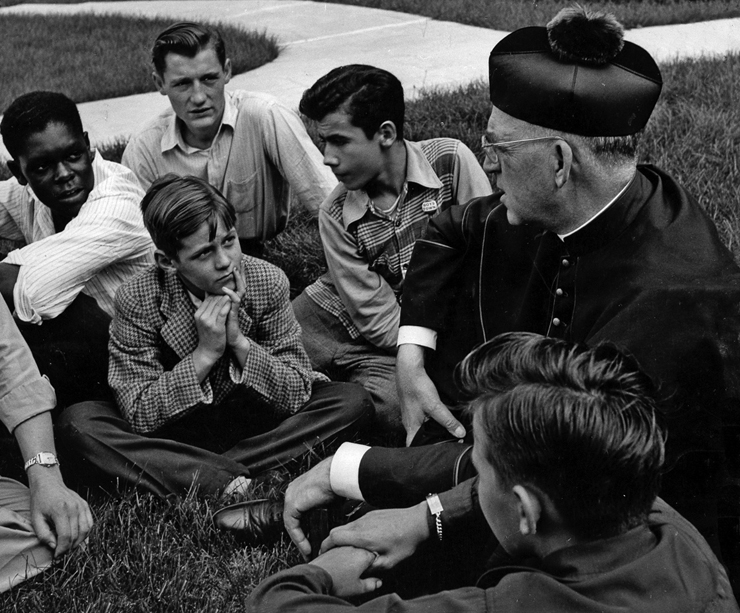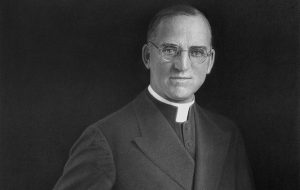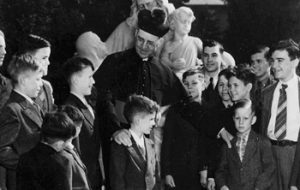
Servant of God Edward Flanagan was a priest, a social reformer, and a founder of an important ministry. He was born to John and Nora Flanagan in 1886, the eighth of eleven children. Edward was born prematurely, and his grandfather Patrick was said to have spent many an hour holding the infant next to the warmth of the kitchen stove and silently praying for the baby to survive. Edward and his siblings grew up on the family farm in Ballymoe, in County Roscommon, Ireland. The Flanagan family was deeply religious and Edward spent much of his childhood caring for the sheep and cattle.
FROM IRELAND TO THE UNITED STATES
After having completed his education, at age eighteen he emigrated with his sister Nellie in 1904, arriving at Ellis Island, New York. He entered Mount St. Mary’s Seminary near Baltimore, graduated two years later, and entered Dunwoody Seminary in Yonkers, New York. While at Dunwoody, he came down with a bad case of pneumonia and had to withdraw. He went to Omaha, Nebraska, where his brother Patrick was a priest and Nellie was his rectory housekeeper. When Edward recovered, he went to Rome for further studies. He soon became sick again, and returned to Omaha and his family’s care. He was able to complete his classes at Innsbruck, Austria, and was ordained a priest there in 1912. He returned to Omaha, where he was appointed assistant pastor at St. Patrick Parish in Omaha. Just days after his arrival, a disastrous tornado struck, demolishing a third of the city and killing more than one hundred people. Father Flanagan worked many hours recovering bodies and making proper burial arrangements. Much of his time for the next few years was spent assisting the many who were left homeless, widowed, orphaned and unemployed due to the tornado. In 1915, his focus turned toward the men who worked seasonally. These unfortunates became unemployed and stranded in the area after a widespread drought. Father obtained an abandoned hotel, cleaned it to the point of being habitable, and opened it in January of 1916 to house hundreds of men. When the United States became involved in World War I in the spring of 1917, the men enlisted and the young priest’s mission was about to change.

SEARCHING FOR THE CAUSES OF UNEMPLOYMENT
During the time that Father Flanagan interacted with the unemployed men, he learned that nearly every one of them had come from a background of neglect, abuse, and/or an absent or deceased parent. The contrast with his own loving, supportive family was stark, and he determined to study the legal system regarding juveniles as well as behavioral science theories. That summer, he began working with some boys in court custody, restoring some sensible, healthful habits to their daily lives and encouraging them to amend their lives. With his Bishop’s reluctant permission, he took custody of several troubled boys, moved them into a home, and with much work and prayer, made the project work. Within a year, he was housing more than one hundred boys, and had twice outgrown the size of the facilities. Father enlisted the help of the Notre Dame Sisters, who provided him with enough teachers for each grade level to function. By the spring of 1921, Father obtained ownership of a large farm located about ten miles from the city, and five buildings were constructed there for the school and living quarters.
BOYS TOWN IS FOUNDED
Called “Boys Town”, the community thrived under Father’s able leadership. In addition to the school and housing facilities, there was a chapel as well as facilities for the boys to learn a trade, and the boys had their own government. He placed great emphasis on education so that the boys would have the tools to be responsible adults, and he inspired each boy to pray every day. The 1938 movie, “Boys Town”, for which Spencer Tracy won an Academy Award for Best Actor, brought international awareness to the project. Mr. Tracy later gave his Oscar statue to Father Flanagan. By the 1940’s, Father changed the living arrangements to small lodges rather than the previous dormitory style in order to promote family-like relationships. He advocated for children’s welfare and numerous times gave speeches and radio interviews, in addition to written essays for magazines and newspapers. He worked for change in the juvenile criminal justice system, and was known to have said, “There are no bad boys. There is only bad environment, bad training, bad thinking.” With the original Boys Town a resounding success, Father traveled extensively, advocating for laws to protect children from imprisonment and abuse. Numerous programs modeled after Boys Town were established, including internationally. At the conclusion of World War II, President Truman appointed Father to take his message to Europe and Asia, for there were large numbers of orphaned children needing help. While traveling in Berlin, Germany, Father Flanagan died of a heart attack May 15, 1948 at age sixty-one.

A LIFE OF SERVICE TO BOYS
Father Edward Flanagan spent his priesthood serving and advocating for boys that no one else wanted to deal with by providing them with a nurturing family-like environment and teaching them good habits. In his lifetime, he directly affected the lives of more than ten thousand boys in a positive way, and many of them recalled with gratitude what he did for them. He was a pioneer in that he served boys regardless of race or religion, which caused him considerable harassment from other clergy, from the justice system, and from the Ku Kux Klan. His remains are interred at Boys Town in Omaha. The Archdiocese of Omaha initiated his cause for canonization, and on St. Patrick’s Day of 2012, Father Flanagan was named Servant of God. This is the first stage of the process during which it will be determined whether he lived a life of heroic virtue. Two alleged miracles due to his intercession are currently being considered for his cause.
